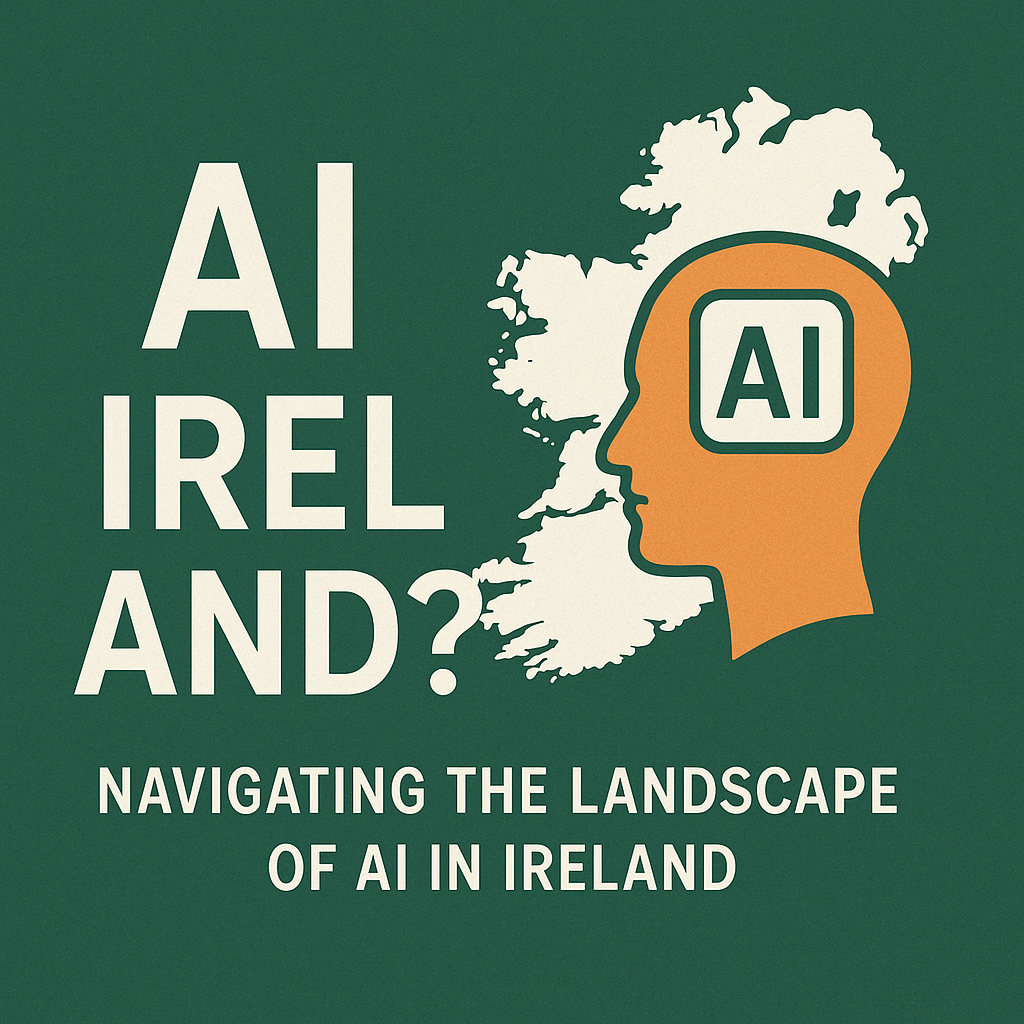
Ireland, a nation steeped in rich history and renowned for its vibrant culture, is increasingly becoming a significant player in the rapidly evolving world of Artificial Intelligence.
From burgeoning startups to established multinational corporations, the spirit of innovation is palpable as the country embraces the transformative potential of AI.
This blog delves into the history of AI in Ireland, explores the current landscape, addresses crucial considerations like plagiarism and the importance of critical thinking in the age of AI, and answers frequently asked questions about AI in the Irish context.
A Glimpse into the Genesis of AI in Ireland
The formal history of AI in Ireland, much like globally, is relatively young. While foundational theoretical work in AI dates back to the mid-20th century, its practical implementation and widespread adoption in Ireland began to gain momentum in the late 20th and early 21st centuries.
Early research efforts were primarily concentrated within academic institutions. Universities across Ireland began to establish computer science departments and initiate research programs that touched upon areas that would later become integral to AI, such as logic programming, natural language processing, and machine learning. These early academic endeavors laid the groundwork for the future growth of the AI sector in the country.
The late 20th and early 21st centuries witnessed the rise of the technology sector in Ireland, fueled by factors like a skilled workforce, attractive tax policies, and a supportive ecosystem for foreign direct investment. This influx of multinational technology companies brought with it significant expertise and investment in areas closely related to AI, such as data analytics, software development, and cloud computing. While not explicitly labeled as “AI” in its nascent stages within these companies, the foundational technologies and the culture of innovation they fostered were crucial precursors to the more recent surge in AI adoption.
The last decade has seen a significant acceleration in AI activity in Ireland. This period has been marked by the emergence of indigenous AI startups, increased research funding in AI-related fields, and the development of national strategies aimed at harnessing the potential of AI for economic and societal benefit. Initiatives like the establishment of research centers focused on AI and data analytics within universities, coupled with government support for innovation, have further propelled the growth of the sector.
The establishment of organizations like the AI Institute Ireland has been instrumental in fostering collaboration, promoting research, and raising awareness about AI across the country. These initiatives provide platforms for researchers, industry professionals, and policymakers to connect, share knowledge, and shape the future of AI in Ireland. The growing prominence of events like the AI Awards Ireland further highlights the dynamism and innovation within the Irish AI ecosystem, recognizing and celebrating the achievements of individuals and organizations pushing the boundaries of AI.
Furthermore, the increasing global focus on AI ethics and responsible development has also resonated in Ireland. Discussions around the societal implications of AI, data privacy, and algorithmic bias are gaining traction, reflecting a commitment to ensuring that AI is developed and deployed in a way that aligns with Irish values and benefits all citizens.
The Contemporary AI Landscape in Ireland
Today, Ireland boasts a vibrant and rapidly expanding AI ecosystem. Several key factors contribute to this growth:
- A Thriving Tech Sector: Ireland remains a hub for major technology companies, many of whom are heavily invested in AI research and development. Their presence creates a demand for Ai ireland jobs and fosters a culture of technological innovation. Many of these companies have significant Ai ireland office presences, contributing to the local AI talent pool and driving advancements in the field.
- A Growing Startup Scene: A new generation of Irish startups is emerging, focusing specifically on AI-powered solutions across various sectors, including healthcare, finance, agriculture, and education. These agile and innovative companies are contributing significantly to the dynamism of the AI landscape.
- Strong Academic Research: Irish universities continue to be at the forefront of AI research, collaborating with industry partners and producing highly skilled graduates in AI-related disciplines.
- Government Support and National Strategy: The Irish government recognizes the strategic importance of AI and has launched initiatives and strategies aimed at positioning Ireland as a leader in AI research, development, and adoption. The national Ireland’s national AI strategy outlines a vision for leveraging AI to enhance economic competitiveness and improve public services while addressing ethical considerations.
- A Focus on Specific Strengths: Ireland is developing particular strengths in areas like AI for healthcare, fintech, and sustainable technologies, aligning with the country’s existing industrial base and societal priorities.
The accessibility of powerful AI tools like ChatGPT has also had a significant impact in Ireland, raising awareness about the capabilities of large language models and driving experimentation across various industries. Irish businesses and individuals are exploring how these technologies can be leveraged for tasks ranging from content creation and customer service to data analysis and process automation.
The growing community of AI expert Ireland professionals is a testament to the increasing sophistication of the field within the country. These experts are contributing to cutting-edge research, driving innovation within companies, and shaping the future direction of AI in Ireland. Initiatives like Women in AI Ireland play a crucial role in promoting diversity and inclusion within the sector, recognizing the vital contributions of women to the field and working to create a more equitable and representative AI community.
Furthermore, the increasing popularity of AI Ireland podcast provides a platform for discussions, insights, and updates on the latest developments in AI within the Irish context, reaching a broad audience and fostering greater understanding of the technology.
Navigating the Ethical Minefield: Plagiarism and the Importance of Critical Thinking in the Age of AI
The rise of sophisticated AI tools like large language models presents incredible opportunities but also introduces new challenges, particularly concerning plagiarism and the potential for diminished critical thinking skills.
The Peril of Plagiarism:
AI-powered content generation tools can produce text that is remarkably human-like. While this can be beneficial for certain applications, it also creates a significant risk of plagiarism. Users might be tempted to simply copy and paste AI-generated content without proper attribution, leading to serious academic and professional consequences.
Plagiarism, the act of presenting someone else’s work or ideas as your own without proper acknowledgment, is a serious ethical violation. In academic settings, it can result in failing grades, suspension, or even expulsion. In professional contexts, it can damage reputation, lead to job loss, and even result in legal action.
It is crucial to understand that even if AI generates the text, the responsibility for ensuring its originality and proper attribution lies with the user. Simply using an AI tool does not absolve individuals of their ethical obligations.
Engaging the Brain: The Importance of Critical Thinking:
Over-reliance on AI tools can also have a detrimental effect on our cognitive abilities, particularly critical thinking. If we become accustomed to AI generating answers and completing tasks for us without actively engaging our own intellect, our ability to analyze information, solve problems, and form independent judgments may weaken.
Critical thinking involves the ability to analyze information objectively, identify biases, evaluate arguments, and draw reasoned conclusions. These skills are essential for navigating a complex world, making informed decisions, and fostering innovation.
While AI can be a powerful tool to augment our abilities, it should not replace our own cognitive processes. It is vital to approach AI-generated information with a critical eye, to verify its accuracy, and to engage with it thoughtfully rather than passively accepting it as truth.
Promoting Responsible AI Use:
To mitigate the risks of plagiarism and the erosion of critical thinking, it is essential to promote responsible AI use through education and awareness.
- Educational Institutions: Schools and universities have a crucial role to play in educating students about academic integrity and the ethical use of AI tools. This includes clear guidelines on citation and attribution for AI-generated content and fostering a culture of critical inquiry.
- Professional Development: Organizations should provide training to employees on the responsible use of AI in the workplace, emphasizing the importance of originality and critical evaluation of AI outputs.
- Individual Responsibility: Ultimately, each individual must take responsibility for understanding the ethical implications of using AI and for developing their critical thinking skills. This involves actively engaging with information, questioning assumptions, and verifying the accuracy of AI-generated content.
By fostering a culture of responsible AI use and emphasizing the enduring importance of critical thinking, we can harness the transformative power of AI while safeguarding academic integrity and intellectual independence.
Frequently Asked Questions: AI in Ireland
Is AI available in Ireland?
Yes, AI is readily available in Ireland. Numerous companies, both multinational and indigenous, are developing and deploying AI-powered solutions across various sectors. Furthermore, access to global AI tools and platforms is widespread.
Is Ireland good for Artificial Intelligence?
Yes, Ireland is increasingly recognized as a favorable location for AI development and adoption. Factors such as a strong technology sector, a skilled workforce, government support, and a growing startup ecosystem contribute to a positive environment for AI.
What does AI mean in Ireland?
In Ireland, as globally, AI refers to the theory and development of computer systems able to perform tasks that normally require human intelligence, 1 such as learning, problem-solving, decision-making, and language understanding. 2 Its application spans various industries and research areas within the country.
Who is eligible for AI?
AI is not something individuals are “eligible” for in the sense of a program or benefit. Rather, AI technologies and tools are available to individuals, businesses, and organizations to use and develop, provided they have the necessary resources and skills. Educational institutions offer programs for individuals to learn about and work in AI.
Which country is doing best in AI?
It’s difficult to definitively say which country is “doing best” in AI as different metrics can be used (research output, commercial adoption, government investment, etc.). The United States and China are often cited as leading countries in AI development and deployment, with significant investments and advancements. However, many other countries, including those in Europe, are making significant strides in specific areas of AI.
What is the AI app that everyone is using?
Currently, there isn’t one single “AI app that everyone is using” globally or in Ireland. However, large language models like ChatGPT have gained significant popularity for their text generation and conversational capabilities. Other widely used AI-powered applications include virtual assistants, image recognition software, and various industry-specific tools.
Is Ireland technologically advanced?
Yes, Ireland is considered a technologically advanced country. It has a strong digital infrastructure, a high rate of internet penetration, and is home to a significant number of leading technology companies. The government also actively promotes technological innovation and adoption.
Which is the smartest Artificial Intelligence in the world?
The concept of the “smartest” AI is complex and constantly evolving. Currently, there is no single AI that surpasses human intelligence in all domains. Large language models like GPT-4 are highly advanced in natural language processing and generation, but they are still limited in other areas. The field of Artificial General Intelligence (AGI), which aims to create AI with human-level cognitive abilities, is still in its research and development phase.
What is Ireland’s national AI strategy?
Ireland’s national AI strategy aims to position the country as a leader in the development and adoption of ethical and trustworthy AI. It focuses on areas such as talent development, research and innovation, infrastructure, and governance, with the goal of driving economic growth and societal benefits while addressing potential risks.
What jobs AI will replace?
AI has the potential to automate tasks across various industries, which may lead to job displacement in some sectors. Jobs involving repetitive tasks, data entry, customer service roles with predictable scripts, and some aspects of transportation and manufacturing are considered to be at higher risk of automation. However, AI is also expected to create new jobs in areas such as AI development, data science, AI ethics, and AI maintenance. The overall impact on employment will depend on the pace of technological advancement and the ability of the workforce to adapt to new roles.
What country owns AI?
No single country “owns” AI. It is a global field of research and development with contributions from individuals, institutions, and companies across the world. While some countries may have a larger presence in AI research and development, the technology itself is not owned by any single nation.
Can I have my own AI?
The extent to which you can have your “own AI” depends on what you mean. You can certainly use and interact with various AI applications and services. Individuals with programming and data science skills can also develop their own AI models and applications, although this requires significant technical expertise and resources. Access to powerful AI models and platforms is becoming increasingly democratized through cloud services and open-source tools.
Conclusion: A Bright Future for AI in the Emerald Isle
Ireland stands at an exciting juncture in its AI journey. With a strong foundation in technology, a growing ecosystem of innovation, and a clear national strategy, the country is well-positioned to harness the transformative power of Artificial Intelligence for economic growth and societal benefit. As Ireland continues to embrace AI, it is crucial to navigate the ethical considerations, promote responsible use, and foster a culture of critical thinking to ensure that this powerful technology serves humanity in a meaningful and sustainable way. The future of Ai ireland jobs, the growth of Ai ireland office presences, and the continued vibrancy of the AI Institute Ireland and the AI Awards Ireland all point towards a dynamic and impactful future for AI in the Emerald Isle, with the contributions of AI expert Ireland and the growing influence of Women in AI Ireland shaping its trajectory.






